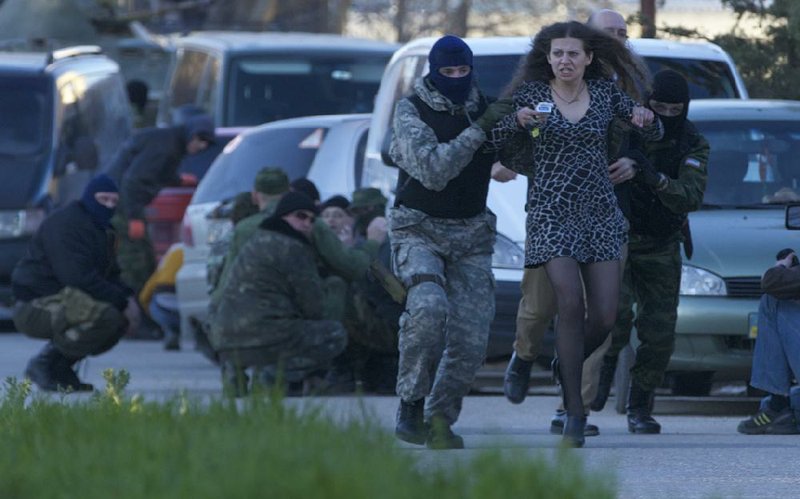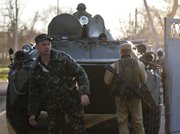BELBEK, Crimea - Russian forces in armored vehicles on Saturday smashed through the gates of one of the last military bases in Crimea still controlled by Ukrainians, firing shots into the air, surrounding the soldiers and demanding their surrender.
RELATED ARTICLE
In footage provided by the Ukrainian Defense Ministry, a Russian-made BTR-80 armored personnel carrier could be seen smashing open a front gate at Belbek, a base across the bay from the port city of Sevastopol.
The military operation at the base - one of the Ukrainian military’s last strongholds on the peninsula - was larger and more dramatic than at other installations where Ukrainian forces have capitulated in recent days as Russia declared its formal annexation of the region. By evening, Russian forces were fully in control, and most of the Ukrainian troops were dispatched to their barracks and homes to pack.
After scattered verbal exchanges with the Russian soldiers gathered outside the base’s black iron fence, the Russian mobilization began about 5 p.m.
There were sporadic bursts of gunfire, and several loud bangs from smoke grenades. At least one Russian soldier fired a handgun into the air repeatedly.
“Why did you shoot?” one Ukrainian asked angrily. “We didn’t fire a single round.”
“This is already Russia,” one Russian soldier shouted at the Ukrainian troops who refused to obey his order to move.
At least one person was injured, beaten by Russian special forces. But it was unclear whether the man was a soldier or a journalist.
After the takeover, Belbek base commander Col. Yuliy Mamchur called together his men, who sang the Ukrainian national anthem and then stood at ease. He then told his men to put their weapons in the base’s armory.
A few hours before, Mamchur attended the wedding of two lieutenants serving at Belbek, despite the looming threat of the raid on the base.
As medic Galina Volosyanchik and communications officer Ivan Benera were being handed a gift and bouquet of flowers, Mamchur said, “You will always remember this; the whole world is here watching.”
Tensions are high in Crimea, after a referendum last weekend in which residents, under the watch of Russian soldiers who had already moved into the region, voted to secede from Ukraine. A spokesman for the Ukrainian military in Crimea said Russian troops earlier Saturday had taken a base at Novofedorivka, near the city of Saki.
Ukraine’s Defense Ministry hasn’t provided details of how many bases it still controls on the peninsula.
In recent days, Russian forces have taken over other bases in Crimea without casualties.
The Russian Defense Ministry said that as of late Friday, less than 2,000 of 18,000 Ukrainian servicemen in Crimea had “expressed a desire to leave for Ukraine.” The ministry, however, did not say whether the remainder of the troops would serve in the Russian army.
No similar information has been forthcoming from Ukraine’s authorities, who have been criticized by servicemen marooned in Crimea, some of whom have complained to the media that they have been given no clear instructions on what they should be doing.
Earlier Saturday, Moscow appeared to try to assuage international worries that its aggression would not stop in Crimea, endorsing the deployment of 100 international monitors to places in Ukraine outside Crimea. Fears of an incursion into Ukraine rose Friday as Russian troops massed along the border. The Russians said the troops were there for training exercises.
The agreement to send monitors by the Organization for Security and Cooperation in Europe, however, pointedly excluded Crimea, drawing condemnation in the West.
A statement from Russia, a member of the organization, said excluding Crimea “reflects the new political-legal realities” because it has “become part of Russia.”
Germany moved swiftly to dispel the idea that a vote allowing the international mission to operate only outside the peninsula constituted recognition for Crimea’s annexation. “The OSCE is expressly not casting into doubt the territorial integrity of Ukraine,” Reuters quoted a government spokesman as saying.
Still, it seems unlikely Russia would agree to an international observer mission if it was planning to pour troops over the border into eastern Ukraine, where demands for greater autonomy from Kiev or even annexation with Russia have emerged among a large population of Russian speakers.
“Russia hopes that unbiased and impartial work of international observers would help overcome the internal Ukrainian crisis,” the Russian Foreign Ministry said. Russia maintains that it was forced to intervene in Crimea to protect the Russian-speaking population, who form a majority in the territory that was part of Russia until 1954. The Russian statement called on the observer mission to help eradicate “radical” elements.
The final agreement among the 57-member Organization for Security and Cooperation in Europe, based in Vienna, was reached late Friday after Russia lifted its objections. But the U.S. issued a statement saying it still considered Crimea part of Ukraine, noting that only Russia disagreed.
The first civilian observers were expected to arrive Saturday night and throughout today, said Tatyana Baeva, a spokesman for the international group. The full contingent will arrive in Ukraine over the next week, she said.
The agreement among member states established the international group’s Special Monitoring Mission for six months, saying it could grow to 500 members if needed. Their main task is to observe the security situation and to report on specific incidents.
There were reports of tension in eastern Ukraine on Saturday, with small demonstrations in at least two cities where pro-Russian protesters demanded a similar referendum to the one held in Crimea last Sunday.
Eastern Ukraine is the heartland of the country’s economically vital heavy industries. It’s also the support base for Viktor Yanukovych, the Ukrainian president who fled to Russia last month after three months of protests in the capital, Kiev, triggered by his decision not to sign an agreement with the European Union.
Russia and Yanukovych supporters contend the former leader’s ouster was a coup and allege that the authorities who took power are nationalists who would oppress the east’s large ethnic Russian population.
More than 2,000 people gathered in Donetsk, a city of almost 1 million, according to the Interfax-Ukraine news service. Demonstrators carrying Russian flags chanted “Russia” and “Yanukovych is our elected president.”
“They’re trying to tear us away from Russia,” said demonstrator Igor Shapoval, a 59-year-old businessman. “But Donbass is ready to fight against this band, which already lost Crimea and is losing in the east.”
Donbass is the name for the region of factories and mines that includes Donetsk.
The demonstrators erected several tents - an echo of the huge tent camp that was established on Kiev’s central square after the protests against Yanukovych broke out in late November.
“I’m ready to live in a tent, but I’m not ready to submit to the West, to dance to their tune,” said Viktor Rudko, a 43-year-old miner.
“I’m for an integrated Ukraine, but with a federal form of governance,” said Mykola, 58, a retired mining engineer who declined to give his last name for fear of reprisal. “The east and west of Ukraine for sure should have a common defense, common science, common culture, but most of the region’s revenues should be kept within this region.”
The rally in Donetsk later dispersed without any disturbances. A similar event is expected today.
The local provincial parliament on Friday formed a working group to develop a referendum analogous to the one in Crimea. Activists on Saturday handed out mock ballots, though no referendum has been formally called.
A number of leading pro-Russian activists have already been detained by police on suspicion of fomenting secessionist activities. The country’s security services said Saturday that they have arrested Mikhail Chumachenko, leader of the Donbass People’s Militia, on suspicion of seeking to seize authority.
Information for this article was contributed by David M. Herszenhorn, Patrick Reevell, Noah Sneider, Neil MacFarquhar, Andrew Roth and Alison Smale of The New York Times; by Adam Pemble, Yuras Karmanau, Jim Heintz, Peter Leonard, Nataliya Vasilyeva and staff members of The Associated Press; by Volodymyr Verbyany and Daryna Krasnolutska of Bloomberg News; and by Carol Morello, Will Englund, Griff Witte and Kathy Lally of The Washington Post.
Front Section, Pages 1 on 03/23/2014



